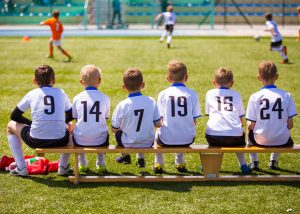Study: Sports Help Disadvantaged Kids in School
According to a recent study in England, disadvantaged children experience stronger benefits from sports than their more affluent counterparts.The long-term study, entitled Investigation of the Associations Between Physical Activity, Self-Regulation, and Educational Outcomes in Childhood, looked at 4,000 children in England and checked in on them at ages 7, 11, and 14. The findings suggests that those who do more physical activity are likely to have stronger ‘self-regulation’ – the ability to keep themselves in check – and in particular may find it easier to control their emotions at an earlier age. Physical activities which promote self-control in this way, such as swimming or ball sports, also have positive, knock-on effects on academic attainment.
 “The attainment gap is a really complex problem, but we know that some of it is linked to less-advantaged children having poor self-regulation skills early in childhood,” Fotini Vasilopoulos, who led the study while a student researcher at the University of Cambridge, said in a press release. “Physical activities that help them to do things like focus on a task or maintain attention could be part of the way to bridge that gap.”
“The attainment gap is a really complex problem, but we know that some of it is linked to less-advantaged children having poor self-regulation skills early in childhood,” Fotini Vasilopoulos, who led the study while a student researcher at the University of Cambridge, said in a press release. “Physical activities that help them to do things like focus on a task or maintain attention could be part of the way to bridge that gap.”
For children around age 7, sports may help develop emotional regulation, or control over one’s own thoughts and feelings, which is linked to higher academic achievement. Children who grow up in disadvantaged settings often struggle with emotional regulation, which can present as frequent mood swings and outbursts. Sports such as swimming and ball sports can help them learn to control their emotions. Games that involve cooperation and that encourage kids to take responsibility for their actions are particularly good at this.
Kids who play sports in middle childhood, around age 11, are better at behavioral regulation, or the ability to manage one’s behavior and attention to achieve goals, which could help them achieve in school.
» ALSO SEE: 10 Observations of a Successful Coach
These findings come at a time when schools are considering how to make up for lost learning during the pandemic.
“Even giving children less-structured opportunities to run around outside could be of real developmental importance,” Ellefson added. “We really need to ensure that physical activity does not become an area schools feel they can legitimately sacrifice to drive up academic attainment. It has a crucial part to play.”
To read the full study from Vasilopoulos, click here.







